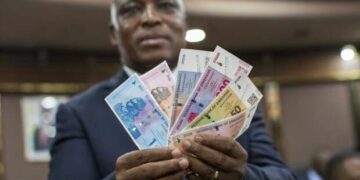Going back to the IMF for a bailout programme not an option – Finance Minister
Minister for Finance, Ken Ofori-Atta, has reiterated government’s stance to not resort to the International Monetary Fund [IMF] for a bailout programme.
The Minister’s assertion follows calls by rating agencies such as Fitch Ratings and some economic analysts in the country for the country to seek an IMF bailout programme given its liquidity and financing challenges occasioned by high budget deficits, rising debt stock and low domestic revenue mobiisation.
Speaking in an interview on Accra-based Asaase Radio, the Minister noted returning to the IMF wiII retrogress government’s efforts of developing the country “Beyond Aid.”
“We have to confront the fact that we can be masters of our own destiny and why do I need the IMF to tell me what to do? We came out of the IMF quickly when we came into power in 2017.
“They (IMF) remain trusted advisors, but whether that instrument of being under the IMF is the only way for a country to grow, I beg to differ. I’m not sure that, that’s the path in emancipating one’s economy.”
“The story of Africa and Ghana has been whether we have truly leveraged our resources in such a way as can truly be used for our own development … which I do believe that we can!,” stated Mr Ofori-Atta.
Contrary to government’s believe that going to the IMF will entail a debt restructuring programme and send wrong signals to investors about the country’s inability to service its debt, Fitch Ratings asserts that Ghana returning to the IMF would rather bolster investor confidence, and could help Ghana regain access to international debt markets given that Ghana’s effective loss of access to international markets increases risks to its ability to meet medium-term financing needs.
Read Also: E-levy to promote cash economy and derail digitisation
“We believe that macroeconomic stresses and pressures on liquidity would probably intensify if Ghana remains unable to issue and does not seek timely support from the IMF,” noted Fitch.
Fitch also notes that the medium-term outlook for Ghana’s finances remains challenging as the country’s problems have been exacerbated by the Covid-19 pandemic.
Revenue, the agency asserts, remains structurally low with very high-interest costs thereby projecting general government interest expense at almost 47% of revenue in 2022 which is well above the median for ‘B’ rated sovereigns of 11%.
According to Fitch, government’s current fiscal consolidation strategy offers a path to debt sustainability, but the country’s gradual pace of deficit reduction leaves it vulnerable to slippage risks.
Ghana’s debt stock currently stands at a little over Ghs 335 billion representing 76.1 percent of GDP.
At end of the second quarter of 2021, the government’s fiscal deficit to Gross Domestic Product (GDP) was estimated at 6.1%, higher than the budgeted target of about 4.5%.
Total revenue and grants was estimated at 6.4% and 5.1% respectively. Domestic revenue excluding grants was 7.7% of GDP.
Tax revenue was estimated at 6.4% of GDP in July 2021, as against 5.9% in July 2020 with total expenditure for the first seven months of 2021 being 13.9% of GDP.
The IMF for this year and 2022 has projected a financing gap of 12.6% and 10.4% respectively.








